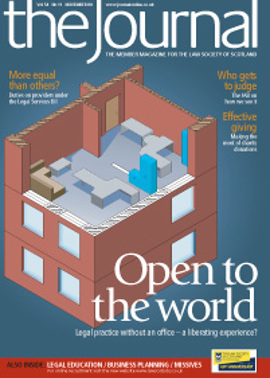Taking on the system

Initial reaction was positive, if cautious. The proposals would after all mean a pretty radical shakeup of the Scottish civil court system. But how would Lord Gill’s report be regarded once the dust had a little time to settle?
The Royal Faculty of Procurators in Glasgow was quickly off the mark, organising a high profile seminar on 19 October in the Glasgow Royal Concert Halls. A sellout audience of about 180 greeted a panel that featured not only the author himself, but Justice Secretary Kenny MacAskill, Sheriff Principal Taylor and Sheriff Mhairi Stephen of the Review’s project board, and Nick Ellis QC and solicitor Robert Carr of the policy group.
Lawyers may be the people who have to operate it, but the justice system is there to serve the public. And Lord Gill in his keynote address made it very clear, as he did in the report itself, that the public’s view is that the present system has broken down, and the public interest was a central point of reference for the review team.
Change, he added, “must be based on a coherent philosophy of civil justice” – something that Scotland has never yet had. The review was based on two key principles: that every litigation should be resolved expeditiously, economically and efficiently; and that every litigation should be dealt with at the judicial level, and by judicial procedures, that are appropriate to its degree of importance.
His “courteous challenge” to his audience, and to the wider audience of judiciary, politicians and public, was, did we accept this? “Anything approaching the present system is not a credible counter proposal.”
Challenge, and opportunity
What would it mean for the profession? Lord Gill wanted to see the profession as “part of a well oiled machine rather than struggling to make the system workable”. It was resilient and adaptable and there would be many opportunities if the proposals were approached in the right spirit.
Opportunity was also Robert Carr’s theme. While there would be challenges in making the proposals work – ending the use of part time sheriffs, case management, actions before district judges, increased use of IT, and time limited hearings were the main ones – he argued that these were outweighed by the advantages. The most significant of these included the increased privative jurisdiction of the sheriff court, having rights of audience in the new sheriff appeal court (which will sit locally for civil appeals) and the specialist personal injury court, the prospect of litigation being attracted back from England & Wales, and the career opportunity presented by district judges.
The citizen should be our focus, he commented, and the report presented a framework for making decisions that are fair and just and improve public confidence in the system.
Practical concerns
Questions from the floor revealed support for the objectives, but some concern over the practicalities. The present summary cause and small claim rules refer to case management but it doesn’t happen, said one solicitor. The sheriffs on the panel hoped in response that greater continuity of judge, helped by the restricted jurisdiction of the district judge, would solve this.
A family lawyer said her local sheriff clerk’s office had difficulties fixing early diets. Sheriff Stephen replied that through case management, proof would not be fixed until the court was sure it had identified the issues that were truly in dispute, and would then be fixed at the appropriate length.
Liz Welsh of the Family Law Association also expressed concern at the perception of downgrading family law work by putting it before district judges, when it “couldn’t be of greater importance for some clients”; but according to Sheriff Principal Taylor, other experience from the UK and Ireland “suggests that they discharge their responsibilities very efficiently”, and he hoped, though naturally couldn’t enforce, that some would develop an interest in family law.
Was it a fundamental difficulty that costs would be front loaded in implementing the reforms? The sheriff principal suggested that this should not be so at least in terms of the judiciary, as the appointment of district judges could be timed to coincide with retirement of sheriffs and phasing out of part time sheriffs (who are almost as expensive as full timers). Lord Gill did concede there would be a “challenge” for Government in incurring transitional costs, in exchange for the “certainty” that total costs would be lower under the new system.
He also agreed that there should be more encouragement for mediation, as it could take out of court “numerous cases that need not be there”, such as neighbour or partnership disputes. But it was the government’s job to provide in-court mediation services.
Prospects for change
One distinguished guest was Lord Justice Jackson, who is currently reviewing the costs system in England & Wales. In a comment from the floor he maintained that the three tier judicial system in place there since 1999 is very successful (though judges there do not combine civil and criminal work). However on the subject of saving money, he warned that it is unlikely that we will avoid having to expand the total number of judges in moving from two to three tiers.
So how does the Government view the recommendations? Mr MacAskill (who opened the speaker list but had to leave before the conclusion) assured the meeting that he accepted the diagnosis in the report, and the need to progress “as expeditiously and as carefully as possible”. He had invited the opposition parties to indicate what they were prepared to agree to. Not all the recommendations would require legislation, and while the costing implications had to be worked out, he did not see the need for another review of what was proposed. However, even given sufficient cross party consensus, we will not see legislation this side of the 2011 elections.
PI: is it broke?
Not all personal injury lawyers are persuaded of the merits of the review’s proposals. David Sandison of Lawford Kidd took Lord Gill up on the comments in the report that the Chapter 43 (Coulsfield) procedures in the Court of Session were working well, and asked how access to justice would be improved by moving most cases to the sheriff court.
To Lord Gill, the question missed the point that you don’t waste public resources by having these cases in the supreme civil court when they could be dealt with just as well elsewhere. Chapter 43 would work equally well introduced, as it now is, to the sheriff court. It was not a sensible use of resources to divert so much of the Court of Session’s administration to one class of litigant.
What about counsel, Mr Sandison followed up. If moving cases to the sheriff court took them out of the equation, would that not impact on clients and the public?
The Lord Justice Clerk responded that many busier PI firms instruct in-house solicitor advocates rather than counsel; they would also become subject to certification. The proposed £150,000 privative jurisdiction limit was taken from a consideration of detailed statistical information on the relationship between recovery and the expense of the proceedings – it was above this level that Court of Session costs were reasonably proportionate.
To Andrew Ireland’s challenge, why Edinburgh for the specialist personal injury court, Sheriff Principal Taylor (who instituted the court now sitting in Glasgow) admitted it had been a pragmatic choice which “can be worked on”. But other sheriffdoms would have specialist PI sheriffs, the only difference being that parties would not have the option of civil jury trial – and there were only half a dozen of these each year.
The bar: good news or bad?
One might expect the Faculty of Advocates to be pretty hostile to a report that threatens to remove about two thirds of the cases from the only court in which counsel’s fees are recoverable as of right. And one chambers (Compass) counter-proposed following the report that the sheriff court privative limit should be only £30,000, with automatic sanction for counsel in any case worth more than £5,000. But, said Nick Ellis QC, there were a variety of opinions within Faculty and many were enthused by the report.
His personal view was that it was an impressive report with outstanding coherence of thinking. Although it seemed to undermine the “cultural heritage” of the Scots litigation lawyer, there were many features of the current system that could not be logically defended, and it is “more broke than I thought”. The need for change was obvious.
It seems however that there is nothing new under the sun. Mr Ellis enlightened us that a docket system had existed in the Court of Session until the early 19th century, but was abandoned because of delays in waiting for the right judge. Written arguments had also been in use but had been manipulated by lawyers, becoming too long and failing to focus the issues. The lesson, he added, was that reforms had to be set in the right context, which supported taking the report as a package.
As for particular effects, cases would require more preparation before they were raised, and wasted expenses would be more likely to result in penalties. He had some sympathy with the concern that solicitors would need guidance as to when sheriff court cases were likely to be sanctioned as suitable for counsel.
A healthy independent referral bar was in the public interest and also necessary to secure the proper implementation of the proposals; but solicitors needed a way of knowing that they could instruct counsel without worrying whether their fees would be recoverable.
More viewpoints>
For a family lawyer’s view, see Opinion; for an environmental lawyer’s, see www.journalonline.co.uk/extras
In this issue
- The equality, diversity and discrimination agenda: change and challenge ahead
- Justice on the green front
- Let the light in
- Needs of the family
- Reality on the West Bank
- Outside of the box
- Effective philanthropy
- Case for the defence
- Taking on the system
- Same rules for all?
- The benchmark
- Law reform update
- From the Brussels Office
- Appreciation: David Hector MacNeill
- Halfway to the Big Bang
- The same but different
- Five steps forward
- Ask Ash
- Preparing for disaster
- Rules a-changing
- Fair competition
- Time on whose side?
- 40 days and 40 nights
- Hear the grown-ups
- Problems of transition
- Scottish Solicitors' Discipline Tribunal
- Website review
- Book reviews
- Life on the other side
- Never waste a good crisis






